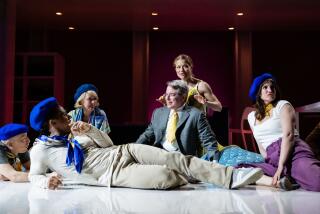Taub Brings a Modernist Sensibility to Beethoven
- Share via
Robert Taub first grabbed the attention of many in the keyboard world in the 1980s when he recorded all of the piano music of American serialist Milton Babbitt. Taub has since joined the ranks of those who are mesmerized by Beethoven, recording all 32 piano sonatas for Vox and performing live cycles of the sonatas here and abroad. Needless to say, he faces a lot more competition in Beethoven than in Babbitt.
Yet Taub is carving out a niche here, bringing a modernist sensibility to Beethoven. Serving up a wide-ranging sampling of four sonatas from the cycle at the Los Angeles County Museum of Art’s Bing Theater on Wednesday night, Taub delivered direct, unsentimental, straight-from-the-shoulder Beethoven, with good rhythm and a staggering degree of clarity that lays every note before the listener.
He didn’t plumb far into the contemplative depths of the later sonatas, nor did he convey much of the singing quality in designated passages (part of the latter may have been due to the bright, luster-less tone of the Yamaha piano on hand). But he didn’t try to stifle Beethoven’s wilder impulses; he let them fly in all their fury and eccentricity.
Taub started with the transitional Sonata No. 15 (“Pastoral”), jumped into the late period with Sonata No. 30, and worked his way through the brief Sonata No. 27 back to Sonata No. 21 (“Waldstein”). Although closing with the heroic “Waldstein” made for good showmanship, it might have been more musically compelling had Taub played these sonatas in numerical order.
That way, we could have followed Beethoven’s extraordinary evolution toward the elevated, inward-looking finale of Sonata No. 30.
More to Read
The biggest entertainment stories
Get our big stories about Hollywood, film, television, music, arts, culture and more right in your inbox as soon as they publish.
You may occasionally receive promotional content from the Los Angeles Times.








